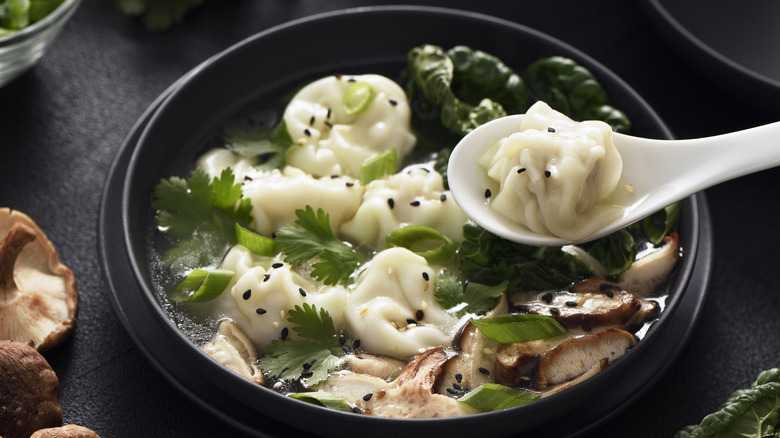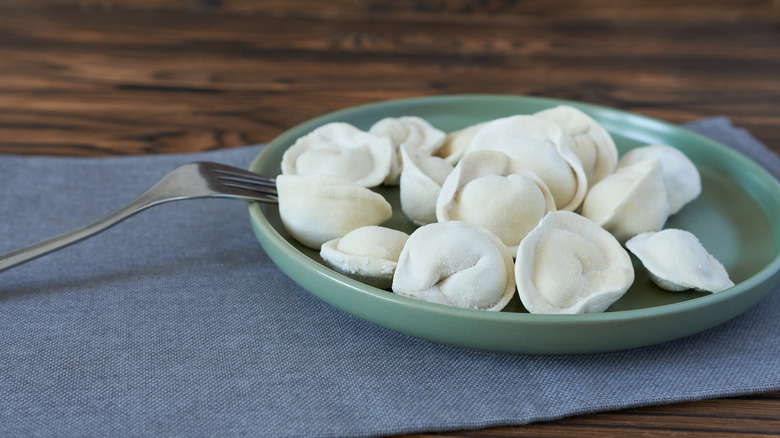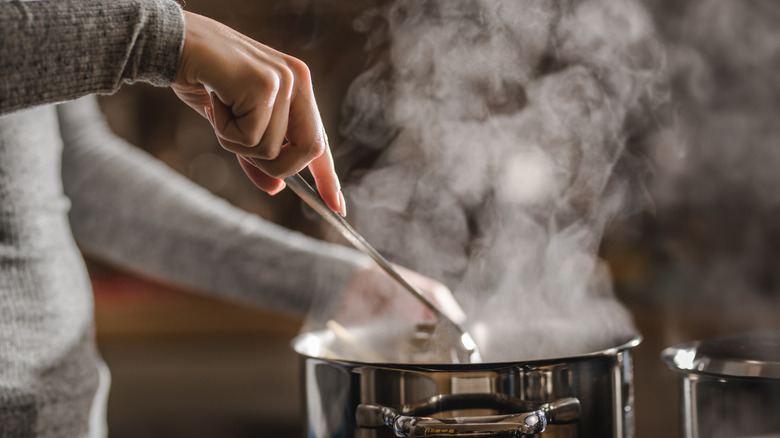How To Properly Store Wonton Soup For Later To Avoid A Mushy Mess
If you're planning to savor wonton soup over the next few days, cooking up a big batch can be as simple as using frozen, store-bought wontons or making everything from scratch. It's crucial to store the extra portions properly so that both the broth and the wontons maintain their flavor. Wontons, especially, need careful storage to retain their texture.
Cooked wontons are best eaten as soon as possible, but to store leftover ones, you must remove them from the broth so they don't become waterlogged and mushy. Place them on a flat surface to cool down for about 15 to 20 minutes before deciding whether to store them in the fridge or the freezer. For short-term storage, arrange the wontons in a single layer inside an airtight container — ensuring to leave some space between each one so their wrappers don't touch and stick together — and place them in the fridge. Consume them within three days.
Wontons have thinner wrappers than dumplings, but you can use the same method for freezing cooked dumplings. This involves wrapping each piece snugly in plastic wrap or parchment paper to prevent them from sticking together. Place them in a single layer on a tray, and freeze them for two to three hours. Next, transfer them into an airtight container, and return them to the freezer. Freezing helps cooked wontons retain their quality for up to three months.
Uncooked wontons require a different storage preparation method
With uncooked homemade wontons, freezing is the best way to store them. Keeping them in the fridge will cause the wrappers to absorb moisture from the filling, making them soggy and causing them to lose their structure.
First, arrange the wontons in a single layer on a lightly floured baking sheet, ensuring the pieces don't touch each other, and then place them in the freezer for about an hour. Once they are frozen, transfer them into an airtight container before putting them back in the freezer. Consume the wontons within three months to avoid freezer burn. It is not advisable to store frozen wontons in zippered freezer bags. The lack of an even surface can lead to an unequal distribution of the wonton pieces' respective weights, which could cause their delicate wrappers to tear or break.
As for storing the soup, let it cool down first. Strain off any solid components such as vegetables and noodles, which will also become mushy when left soaking in liquid. These should be placed in separate containers with tight lids for refrigeration. (Before storing cooked noodles, toss them in oil first to prevent the strands from sticking together during storage.) Pour the broth into an airtight container and keep it in the fridge for up to four days. If you prefer to freeze the broth, follow the same steps and then store the soup in the freezer, where it can last for up to three months.
Thaw wonton soup properly to bring out its best quality
When it comes to reheating wontons, different methods apply depending on whether they are cooked or uncooked. Just like how frozen dumplings can be tossed into boiling ramen, you can place uncooked frozen wontons directly into a pot of boiling broth. Cooked ones, however, require overnight thawing; transfer them from the freezer to the refrigerator, and then heat them up the next day either by steaming for five minutes or microwaving for 45 seconds. They must reach a minimum internal temperature of 165 degrees Fahrenheit to ensure they are safe to eat.
There's also a proper way to reheat wonton soup. If you've stored it in the fridge, bring the soup to a boil on medium heat. Once it bubbles, add in the wontons. Allow everything to warm up for 15 to 30 seconds before removing the soup from the stove. If the broth is frozen, let it liquefy over medium heat, stirring occasionally. Once it has melted, increase the heat, then add in wontons along with fresh noodles and vegetables. Upgrade your soup with some crunch by topping it with fried shallots, chopped chives, and toasted sesame seeds.
Before reheating wonton soup, check each component for signs of spoilage, such as an unappetizingly sour or rancid smell. Discard the broth if it has changed color or if sediments have formed at the bottom. As for wontons, examine them closely for signs of mold, sliminess, and discoloration on their wrappers.


